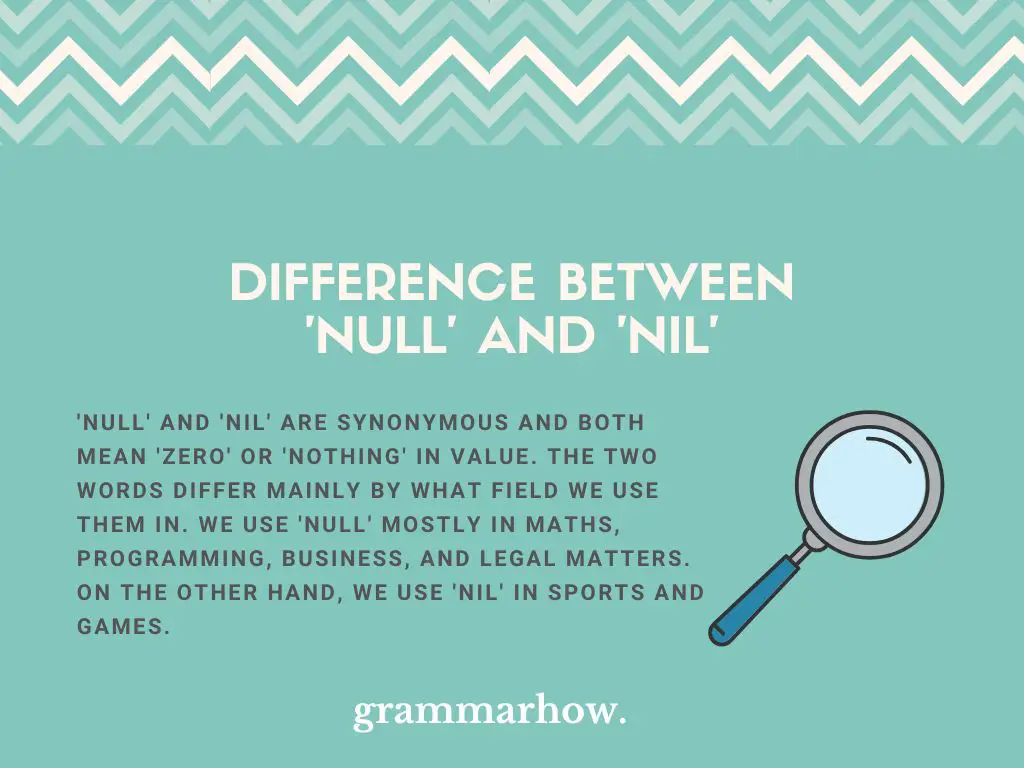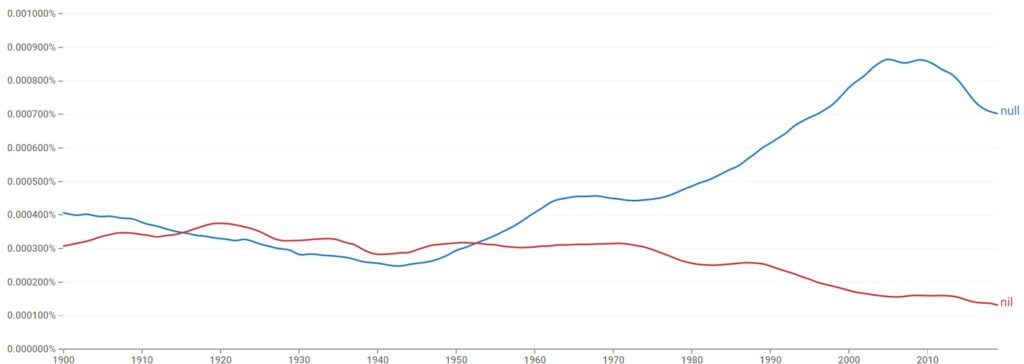We all know how vast the English language is. Inevitably, some words overlap in meaning or differ only in function. Sometimes, words don’t even differ by meaning but just by what field they’re used in. Take ‘nil’ and ‘null’ for example. How are they different? Let’s see.
What Is the Difference Between ‘Null’ and ‘Nil’
‘Null’ and ‘nil’ are synonymous and both mean ‘zero’ or ‘nothing’ in value. The two words differ mainly by what field we use them in. We use ‘null’ mostly in maths, programming, business, and legal matters. On the other hand, we use ‘nil’ in sports and games.

‘Null’ and ‘nil’ essentially mean the same which is having zero, nothing, or a nonexistent value. Essentially, the two words only differ in what field we often use them.
We use ‘null’ often in math, programming, business, and legalities. However, we can use the term in other fields as well. Take a look at the example below.
- It’s best to remove the null sets in the report as they are irrelevant.
In the sentence above, ‘null’ is used to describe sets (most likely referring to mathematic sets) that have zero or no existing elements and data, which the person wants to remove since they are irrelevant.
We use ‘nil’ often in sports and games. We use it to indicate a score of zero or nothing. Take a look at the example below.
- The outside team won by three-to-nil.
In the sentence above, ‘nil’ indicates that the score of the home team is ‘nil’ which means zero or nothing.
While the two words are grammatically correct and are still used by some, both words are not as commonly used today. Most use other synonymous terms like ‘zero’ or ‘nothing’ especially since they are more flexible in terms of usage.
‘Null’ and ‘nil,’ though they have specific usages, are generally interchangeable as they essentially mean the same. Unless the context requires a specific word, ‘null’ and ‘nil’ are interchangeable. An example where the two are not interchangeable is when we are talking about legal matters since we only use ‘null’ for such context.
Null
‘Null’ means nothing, zero, or a nonexistent value. It’s a more technical term we often encounter in mathematics, programming, business, or legal matters. An example of this is saying ‘null set’ in math which means a set that has zero or no existing elements in it.
According to the Cambridge Dictionary, ‘an empty value or a zero.’ On the other hand, it also means ‘having no legal force’ or ‘null and void’ in legal matters.
Below are examples of using ‘null’ in a sentence.
- Their marriage was declared null after filing a divorce.
- The image search for the item returned null results.
- The report states that the data was null.
- The null hypothesis of the experiment was accepted.
- The encoded value returns a null string.
- The expired contract is now null and void.
- The data returned a null set.
Note that the examples above are also specific to fields, such as maths, law, and programming, as the function of ‘null’ is clearer and more technical in such contexts.
Nil
‘Nil’ is a term that means nothing or zero. We usually use this term in sports and games, when talking about the score of someone. An example is saying ‘the team lost by 3-to-nil’ meaning that the score is 3-to-0. However, we also use ‘nil’ in other contexts as well.
According to the Cambridge Dictionary, ‘nil’ means ‘nothing or zero.’ While this is often used to refer to games and sports, it applies in many other contexts as well.
Below are examples of using ‘nil’ in a sentence.
- The home team won with a landslide of four-to-nil.
- Shiela claims that the chances of us failing are nil.
- Before, our debt was nil, and now we’ve become bankrupt.
- The possibility of us escaping is nil.
- His knowledge of world history was nil.
- The results of the experiment are nil.
- The use of a physical map is nil nowadays.
Which Is Used The Most?
According to the Google Ngram Viewer, ‘null’ is generally used more often than ‘nil.’ While there was a short uprise in the use of ‘nil’ in the 1910s, ‘null’ was used more often again in the 1950s and the gap has continuously enlarged as of today.

‘Null’ is probably used more often because we used it in various fields like math, programming, or legal matters, in which the word ‘null’ is not exactly replaceable by another word as it is a technical term.
Final Thoughts
‘Null’ and ‘nil’ are almost synonymous words that both mean having zero or nothing as a value. Their main difference lies on where we use them. We use ‘null’ mostly in maths, laws, businesses, and computers. On the other hand, we use ‘nil’ for sports, games, and other categories.

Martin holds a Master’s degree in Finance and International Business. He has six years of experience in professional communication with clients, executives, and colleagues. Furthermore, he has teaching experience from Aarhus University. Martin has been featured as an expert in communication and teaching on Forbes and Shopify. Read more about Martin here.
